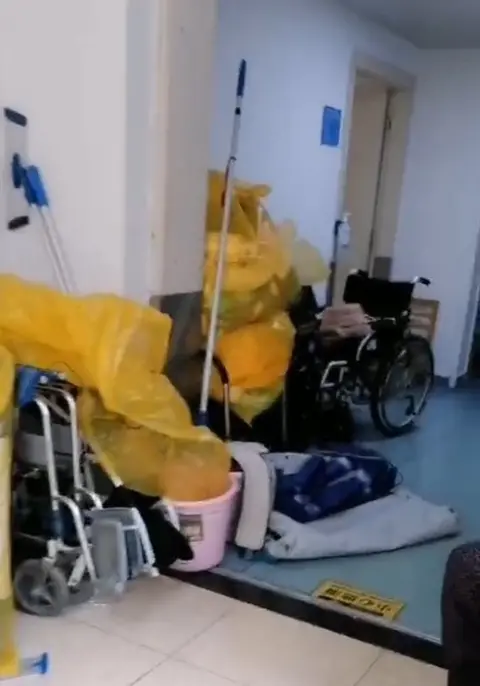China: Shanghai hospital struggles with Covid infections
 Donghai Hospital
Donghai HospitalAuthorities in Shanghai are struggling to deal with a suspected wave of Covid infections at a large hospital for the elderly, in a sign of how serious the outbreak is in China's biggest city.
Shanghai has not declared any new Covid deaths in the city since the outbreak of the latest wave of the virus.
But the BBC has spoken to people working at the Donghai Elderly Care Hospital in the city's eastern Pudong area who have described a dire situation and desperate attempts to help dozens of elderly patients, some of whom have died.
A nurse told the BBC that the first positive cases were discovered at the facility - one of the biggest of its kind in Shanghai - three weeks ago.
Since then it has been sealed off, and specialist teams from the municipal centre for disease control have been trying to contain the spread.
Another care worker who was drafted in to work at the hospital last week told us she had seen one patient die, and heard of a colleague who had dealt with another dead patient.
But workers say that it is hard to tell if the victims had died from Covid as there have been many infections.
The nurse told the BBC that she was working and sleeping at the hospital before being moved to a quarantine facility. Since then she said a colleague had told her the situation had gotten "worse and worse" with new cases "every day".
She claimed that both medical staff and experts sent in by the Shanghai government were also infected, saying hundreds of people there had caught Covid.
She told the BBC: "At first, we just kept working as usual, but later they started to block each department and the manager told us the real situation was much worse."
She said there were patients who were refusing to wear masks.
A care worker who has been working at the hospital this week told the BBC that "sanitary conditions were pretty bad" when she arrived.
Videos taken from within the facility and sent to the BBC appear to show overflowing bins and full bags of rubbish strewn in hallways in at least one part of the home.




Meanwhile on social media, there have been multiple complaints from people who said they were unable to contact their loved ones in the facility.
One man who told the BBC his grandmother is at the hospital said it was very difficult to get information on her condition. A care worker whom he spoke to initially was unable to help further after they tested positive and were quarantined.
He says he has not been able to speak to his grandmother on the phone since shortly after the lockdown began on Monday. Staff who picked up when he called were unable to give any details about what she was being given to eat, or any medication administered, he said.
The BBC has tried to contact Donghai Hospital, Pudong New District Health Commission and the Shanghai Municipal Commission for comment, but none responded to our calls.
A nearby funeral home, contacted by the BBC, was unable to say if it had or had not received any dead patients from the hospital. The Shanghai Foreign Affairs office was also approached for a comment, but did not respond.
But in repeated public statements the authorities have confirmed cases citing the address of the hospital, though they did not specifically name it. The address has been mentioned nine times in official case reports in the last two weeks.
Struggling system
There's evidence elsewhere that Shanghai's health care system is struggling to deal with some of the increased demands put on it.
On Thursday health officials offered a formal apology to the family of a 62-year-old man who died after he was refused further emergency treatment for an asthma attack. An ambulance medic who refused to transport the patient or offer the use of an AED has been suspended.
Shanghai is China's biggest city with a population of almost 25 million. It's half-way through a nine-day citywide lockdown to try to stop the spread of a resurgent virus.
Officials had planned to shut the eastern half of the city and test everyone living there, then impose the same lockdown on the western side of the city.
Despite plans to open up Pudong on Friday, there are stringent measures still in place and delayed test results which mean many areas, and millions of people, remain locked down.
A week before the lockdown was imposed other officials had claimed that Shanghai was too big and too important to China's economy to be locked down in the way that other cities like Wuhan, Xi'an and Shenzhen had been.
But now a senior Communist Party official has admitted Shanghai had not been prepared for the outbreak. Ma Chunlei said yesterday that "our awareness was insufficient... our preparation is not sufficient".
In a rare public admission of failings he added: "We sincerely accept your criticism and we are working hard to improve."
